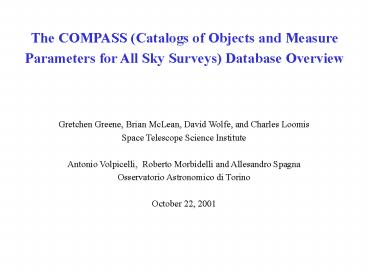DFS Fringes - PowerPoint PPT Presentation
1 / 10
Title:
DFS Fringes
Description:
The COMPASS (Catalogs of Objects and Measure Parameters for ... Eccentricity. 21. Semi Major Axis. 20. Classification. 19. N Magnitude Error. 18. N Magnitude ... – PowerPoint PPT presentation
Number of Views:39
Avg rating:3.0/5.0
Title: DFS Fringes
1
The COMPASS (Catalogs of Objects and Measure
Parameters for All Sky Surveys) Database Overview
Gretchen Greene, Brian McLean, David Wolfe, and
Charles Loomis Space Telescope Science
Institute Antonio Volpicelli, Roberto
Morbidelli and Allesandro Spagna Osservatorio
Astronomico di Torino October 22, 2001
2
Introduction Database Functionality
- Key Component in the GSC-2 catalog production
- Online access to processed plate data
- Identification of unique sources
- Cross-indexing of multiple observations
- Overlapping photographic plates
- Multiple epochs
- Global recalibration capability
- GSC 2 is exported from COMPASS
- Successful demonstation of Object-Oriented
technology and the selection of commercial
software, Objectivity/DB - One of the first large-scale astronomical
archives - Estimated 2 billion objects, 10 billion
sources/observations - 4 TB catalog derived from 8 TB image archive!
- Collaborative project with OATo and SDSS JHU
Science Archive - OATo assisted with schema development, QA
(CIQA), plate- matching and much more! - SDSS/STScI joint development of the HTM Indexing
Hierarchical Triangulated Mesh Level 3
Leafnode S213
3
Infrastructure How is the Database designed?
- Object model or design is based on hierarchical
systems for efficiency - Federation of Databases and Containers
- Plate data information stored in 2 forms for
access - MetaData and Observations within each HTM region
Plate Database
for each of 32768 regions
HTM Region Database
for each plate
RegionInfoContainer
RegionCatalogContainers
for each plate section within region
Page Federated Database
Section of reference catalog within region
Database
GSPC2
Container
Class/Basic Object
Tycho2
COMPASS Federated Database
4
Highlights What happened in 2001
- Completion of Loading and Cross-Matching
Observations All-Sky, 2 bands - Reference catalogs Successfully loaded GSPC2 and
Tycho2 into COMPASS, utilize real-time
object-matching based on GSC1 - Fully Online RAID System Has been upgraded to
4TB using NT client/server configuration. - Export of GSC 2.2 Public Release The export of
1 billion objects from the database with best
observation position selection, magnitude and
classification filtering for accuracy. - Steady State Production Operations Catalog
production pipeline, recalibration, and
administration of multi-Terabyte data volume - HST Bright Object Protection (BOP) GSC-2.2
incorporation into Observation Planning Tools and
target acquisition development (APT) special
release - ShowSky JAVA Visualization Tool Public Release
- Multiple Catalog viewing, including SDSS,
2MASS, Tycho, DSS, GSC. - Parameter Filtering
- HTM grid field view with level
5
GSC2.2 Export Catalog Fields what will change
with 2.3?
- Define new requirements and evaluate current
parameters early enough to avoid schedule slips - need time to develop modifications to export task
- Coordination of DB administation with science
goals - How do we want to query the catalog?
- move toward mining.
6
Export Catalog Current configuration and moving
toward GSC 2.3
- Source identification
- names from GSC2.2 release should be preserved now
that the catalog has been incorporated into
telescope operations, is this always possible? - Catalog column parameters, new ones? Changes to
existing? - Position currently is based on observation
closest to plate center for the same bandpass - Astrometric residuals were verified to be a
factor of 2 improved. - Reclassification further definition of non-star
into galaxy, blend, etc. - Plate identification
- epoch is non-unique distinction of plate source
- Multi-plate calibrated parameters, proper
motion - API development will benefit from experience of
previous catalog pipeline tasks, e.g. Plate
loading and object/source cross matching. - Minimize the large scale transaction time,
perform dynamically if possible. - Will this parameter be changing
7
(No Transcript)
8
Multi-Archive at STScI CASB coordination with
MAST
- MAST develops and maintains the public data
release WWW user interface for SDSS and the STScI
WWW pages for GSC-2 - individual development sites provide more
project specific information - CASB
- FNAL
- JHU
- Unified view of STScI archives
- Growth in the large scale catalog archives
- Cross correlation of mission data now possible,
development of large scale correlations between
ground and space missions in progress.
9
Moving toward Multi-catalog archive SDSS and
GSC-2 joint operation at STScI
- Data Archive Server is mirrored parallel to GSC-2
on hybrid LINUX/NT dual server. - New Develop of MAST/GALEX archive based on
GSC-2/SDSS archive interoperation - SDSS population into COMPASS for high speed
cross-matching utilizing HTM - no spatial remapping
- New Database Engine?? There is a possibility that
SDSS will migrate from Objectivity to another
commerical system, e.g. SQL server.
10
Future Developments GSC-2 enhancements to
support access for science and operations
- 2MASS population into COMPASS
- GSC-2 2-MASS will be input catalog of NGST
guidance system - 2MASS also utilizes HTM for their file system
- SDSS population into COMPASS
- Direct public access to COMPASS observations
extended for higher speed access - HTMIndex container using sorted level10 source
indexing as in export catalog similar to the
export catalog infrastructure - Correct Internal database page file limitations
- GSC2Query Enhancements
- GSC-2, SDSS, GALEX, 2MASS gtgtgtgt NVO (National
Virtual Observatory) - Still very early in conceptual stage, but
nevertheless it is real, 10M NSF grant is
currently issued for collaboration between STScI,
Caltech, JHU others.































